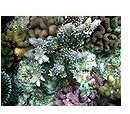The Coral Reefs in Danger --- Impacting the Lives of Millions
Coral Reef Facts
Majority of the world’s population rely on coral reefs because the reefs’ ecosystem plays a major role in overall marine life existence. Yet coral reefs are dying as global warming heightens through the continuous emissions of greenhouse gases. The ocean water acidity and temperature of seawater, is causing massive bleaching leading to their eventual death and disappearance.
Reports gathered disclose various coral reef facts which shows that an estimated 1/5 of the worlds’ reef formation have already disappeared as early as the 1950’s due to human pollution and over fishing. Today, recent reports have it that in the U.S. alone, the coral reef ecosystems have been assessed as either in poor or fair conditions. These reefs are expected to vanish from the entire Coral Triangle region of the Pacific Ocean at the end of the century.
Causes and Effects as to Why Coral Reefs are Dying
To date, the findings of scientists from all around the world showed that fish density is declining by as much as 6% every year. Much of the impact regarding these losses has already affected the livelihood and subsistence of people thriving in developing countries. Their food, their tourism and the protection of their shorelines from possible erosions rely, heavily on the existence of the coral reefs.
The damage to coral reefs that transpired over the past 30 years was brought about by the increased intensity of warming ocean temperature. Pollutions from coastal developments caused sedimentations that drove away fish species responsible for keeping the coral reefs algae-free and as algae continued to infest the reefs, plagues of coral diseases resulted to their deaths and disappearance. As if all of these were not enough, the frequency and the harshness of storms and hurricanes prevent the reefs from recovering. The World Wildlife Fund reports that the causes and effects of the destruction of coral reefs have already threatened the lives of about 100 million people who rely on these reef formations.
Can We Save the Coral Reefs?
To rescue the corals, every government in every nation all across the globe are making conscious efforts to implement the laws and preventive measures that will address the causes of pollution, global warming, greenhouse gas emissions and excessive fishing. On a personal level, there are some ways we can help to lessen further damages to the reefs:
-
For aquarium lovers or those who intend to become one, it would help a lot if you were more selective of your suppliers. Common ornamental fish species are already endangered and are bound for extinction due to large scale harvesting of these species away from their natural habitats. Buying your ornamental fish from unknown and undocumented sources means, endangered species could have been harvested from the wilds. U.S. Port Authorities have established that for every tropical fish harvested, only one out of ten survives.
-
If you are in the fish selling business, it will help if you are also selective of your suppliers. The fishing methods being used by your suppliers may be any of the following harmful methods:
Trawling - this method causes large-scale destructions of seabed, leaving the natural habitat on the ocean floor devastated. Heavy steels and chains scrape the corals and plants and other marine life inside large fishing nets. According to studies, an estimated 25 billion of these plants, corals and marine animals die each year and are thrown back as garbage into the sea for the simple reason that they could not be sold.
Dynamite Fishing - The use of dynamites to stun species of fish from out of their hiding; a lot of species are left paralyzed and dying on the ocean floor.
Cyanide Poisoning - Cyanide is squirted by illegal fishers in and around corals to cause temporary paralysis to their prey, but the residue remains floating in the water bringing death to the small fishes and coral animals.
We ask the government to look after our welfare while we all enjoy the bounties of nature. Perhaps in our own little ways we should all make a conscious effort to be more environmentally responsible. Buying from fish legal traders may cost you more, but at least you are buying from those who use methods that are governed and monitored by laws that protect the environment. We can contribute in our respective government’s efforts to rescue the coral reefs by not contributing directly or indirectly, to increase the number of the dying coral reefs.
